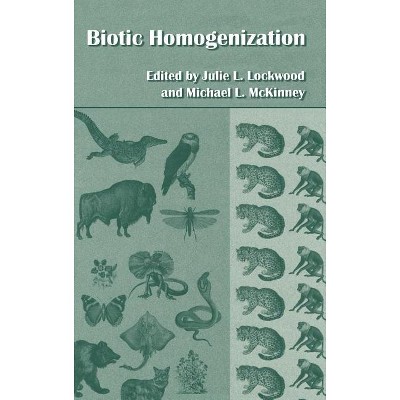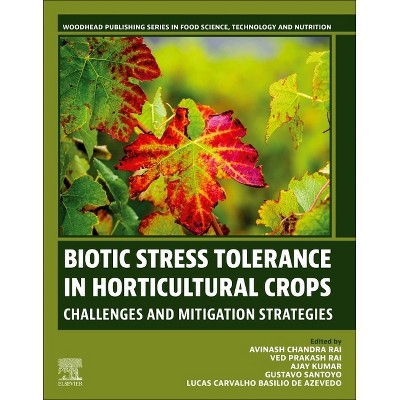Sponsored

Biotic Borders - by Jeannie N Shinozuka (Hardcover)
$95.00
In Stock
Eligible for registries and wish lists
Sponsored
About this item
Highlights
- A rich and eye-opening history of the mutual constitution of race and species in modern America.
- About the Author: Jeannie N. Shinozuka is assistant professor of comparative ethnic studies at Washington State University.
- 296 Pages
- Science, Life Sciences
Description
About the Book
"This timely book reveals how the increase in traffic of transpacific plants, insects, and peoples raised fears of a "biological yellow peril" beginning in the late nineteenth century, when mass quantities of nursery stock and other agricultural products were shipped from large, corporate nurseries in Japan to meet the growing demand for exotics in the United States. Jeannie Shinozuka marshals extensive research to explain how the categories of "native" and "invasive" defined groups as bio-invasions that must be regulated-or somehow annihilated-during a period of American empire-building. Shinozuka shows how the modern fixation on foreign species provided a linguistic and conceptual arsenal for anti-immigration movements that gained ground in the early twentieth century. Xenophobia fed concerns about biodiversity, and in turn facilitated the implementation of plant quarantine measures while also valuing, and devaluing, certain species over others. The emergence and rise of economic entomology and plant pathology alongside public health and anti-immigration movements was not merely coincidental. Ultimately, what this book unearths is that the inhumane and unjust incarceration of Japanese Americans during World War II cannot, and should not, be disentangled from this longer history"--Book Synopsis
A rich and eye-opening history of the mutual constitution of race and species in modern America. In the late nineteenth century, increasing traffic of transpacific plants, insects, and peoples raised fears of a "biological yellow peril" when nursery stock and other agricultural products shipped from Japan to meet the growing demand for exotics in the United States. Over the next fifty years, these crossings transformed conceptions of race and migration, played a central role in the establishment of the US empire and its government agencies, and shaped the fields of horticulture, invasion biology, entomology, and plant pathology. In Biotic Borders, Jeannie N. Shinozuka uncovers the emergence of biological nativism that fueled American imperialism and spurred anti-Asian racism that remains with us today. Shinozuka provides an eye-opening look at biotic exchanges that not only altered the lives of Japanese in America but transformed American society more broadly. She shows how the modern fixation on panic about foreign species created a linguistic and conceptual arsenal for anti-immigration movements that flourished in the early twentieth century. Xenophobia inspired concerns about biodiversity, prompting new categories of "native" and "invasive" species that defined groups as bio-invasions to be regulated--or annihilated. By highlighting these connections, Shinozuka shows us that this story cannot be told about humans alone--the plants and animals that crossed with them were central to Japanese American and Asian American history. The rise of economic entomology and plant pathology in concert with public health and anti-immigration movements demonstrate these entangled histories of xenophobia, racism, and species invasions.Review Quotes
"Jeannie N. Shinozuka's monograph, Biotic Borders: Transpacific Plant and Insect Migration and the Rise of Anti-Asian Racism in America, 1890-1950, has prescient insight for those interested in such human and nonhuman interconnections. . . . While Shinozuka's work is clearly a contribution to environmental history and Asian studies, it is also a fresh conversation on borderlands and the role that Japanese immigrants, among other migrant groups, played in such porous places as the US Mexico border and Hawaii, the Pacific gateway to the US empire."-- "H-Net"
"Biotic Borders is an ambitious study that successfully weaves together the stories of human and nonhuman migration and exclusion, all while telling a fascinating story of the rise of federal borders, bureaucracy, technocratic expertise, and quarantine practices."-- "History and Philosophy of the Life Sciences"
"Biotic Borders provides a detailed, systematic analysis of how Asian immigrants became ensnarled historically with practices of pest control. This eye-opening work will be required reading for updated historical understandings about the relationship between biological science, racism, and nationalism."-- "Journal of the History of Biology"
"A significant work of historical scholarship. . . . This book is an excellent historical and definitive account of important topics, campaigns, peoples, and places. But the larger public and policy implications of her histories are what vaults this book into an essential primer for many audiences, both inside and outside academia."-- "American Historical Review"
"An eclectic work, far-ranging in its sites and examples."-- "Pacific Affairs"
"Biotic Borders presents a uniquely fascinating ecological history and sociocultural analysis of the transmigration of Asian plants and insects during the period of American empire building in the late nineteenth and twentieth centuries, with a focus on the 'mass migration of Japanese plant and insect immigrants.' Shinozuka skillfully weaves together a historical analysis of anti-Asian racism and its relationship to research in the agricultural, environmental, and health sciences. . . . An important contribution to the history of American empire building, showing the ecological impacts of U.S. expansion in the Pacific region and highlighting Asian, Asian American, and Hawai'ian perspectives."-- "Isis"
"This book will broaden the reader's understanding of botany, the nursery trade, and invasive species regulations while offering rare insights into the different historical figures and groups that have shaped the story. . . . Highly recommended."-- "Choice"
"An original, important, and exciting scholarly work. Shinozuka supports her thesis and its claims with abundant examples scoured from an extensive collection of archives. But this is no mere empirical study. Its strength is in Shinozuka's theoretical scaffolding, deftly concealed, that undergirds her reading of historical sources. The result is a compelling narrative that is informed by this theory, and that never loses the reader. This is a highly readable book with a powerful argument, and a story about the Japanese American experience that needs to be told."--Vassiliki Betty Smocovitis, University of Florida
About the Author
Jeannie N. Shinozuka is assistant professor of comparative ethnic studies at Washington State University.Dimensions (Overall): 9.0 Inches (H) x 6.0 Inches (W) x .75 Inches (D)
Weight: 1.3 Pounds
Suggested Age: 22 Years and Up
Number of Pages: 296
Genre: Science
Sub-Genre: Life Sciences
Publisher: University of Chicago Press
Theme: Ecology
Format: Hardcover
Author: Jeannie N Shinozuka
Language: English
Street Date: April 20, 2022
TCIN: 1006098452
UPC: 9780226817293
Item Number (DPCI): 247-44-2171
Origin: Made in the USA or Imported
If the item details aren’t accurate or complete, we want to know about it.
Shipping details
Estimated ship dimensions: 0.75 inches length x 6 inches width x 9 inches height
Estimated ship weight: 1.3 pounds
We regret that this item cannot be shipped to PO Boxes.
This item cannot be shipped to the following locations: American Samoa (see also separate entry under AS), Guam (see also separate entry under GU), Northern Mariana Islands, Puerto Rico (see also separate entry under PR), United States Minor Outlying Islands, Virgin Islands, U.S., APO/FPO
Return details
This item can be returned to any Target store or Target.com.
This item must be returned within 90 days of the date it was purchased in store, shipped, delivered by a Shipt shopper, or made ready for pickup.
See the return policy for complete information.











